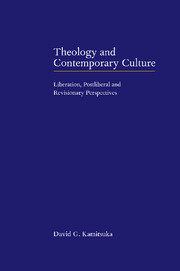Book contents
- Frontmatter
- Contents
- Acknowledgments
- Introduction
- 1 Values informing conceptions of theology
- 2 Apologetics and the linguistic-historical turn
- 3 Credibility in the pluralistic public realm
- 4 Reading the Bible theologically as the church's book
- 5 Pursuing doctrinal common ground
- 6 Virtues and vices in theological practice
- Select bibliography
- Index
6 - Virtues and vices in theological practice
Published online by Cambridge University Press: 29 September 2009
- Frontmatter
- Contents
- Acknowledgments
- Introduction
- 1 Values informing conceptions of theology
- 2 Apologetics and the linguistic-historical turn
- 3 Credibility in the pluralistic public realm
- 4 Reading the Bible theologically as the church's book
- 5 Pursuing doctrinal common ground
- 6 Virtues and vices in theological practice
- Select bibliography
- Index
Summary
Although there are many differences among liberation, postliberal and revisionary perspectives on a spectrum of methodological and constructive issues, I have suggested some ways in which to recast those differences so as to open trajectories for fruitful future inter movement engagement. Each movement's approach has its strengths and weaknesses, its insights and oversights. I have tried to draw from what I believe are the strengths and insights of each in order to formulate proposals for theological practice better able to respond to contemporary culture's ecclesial, intellectual and social challenges. Wide reflective equilibrium apologetics, while not the only workable mode of theological engagement in the pluralistic public realm, forecasts necessary elements of an approach that is postmodernly sensitive, ideologically vigilant and Christian-specific: wide coherence, overlapping consensus and assimilative power tested by critical background theories. Other models for theologically reading the Bible as the church's book may exhibit hermeneutical impulses more diverse than the three to which I attended (pluralism, continuity, and critique); however, the regulative-dialectical conceptuality is a workable way for instantiating all three. The anticipated result is a sufficiently stable scripture and tradition relationship which remains open to change and otherness in an age of textual deconstruction, Christian communal plurality and creativity from history's underside.
These approaches to apologetics and hermeneutics, I argued, sustain the three movements' focal values. In the future, these values may be revised or new ones may be added but, for our current era, I believe theology is well served by being accountable to these values: fully critical reflection in the public realm, thick description of the habitable scriptural world which forms Christian communal character, solidarity with the struggles and spiritualities of the oppressed.
- Type
- Chapter
- Information
- Theology and Contemporary CultureLiberation, Postliberal and Revisionary Perspectives, pp. 173 - 195Publisher: Cambridge University PressPrint publication year: 1999



